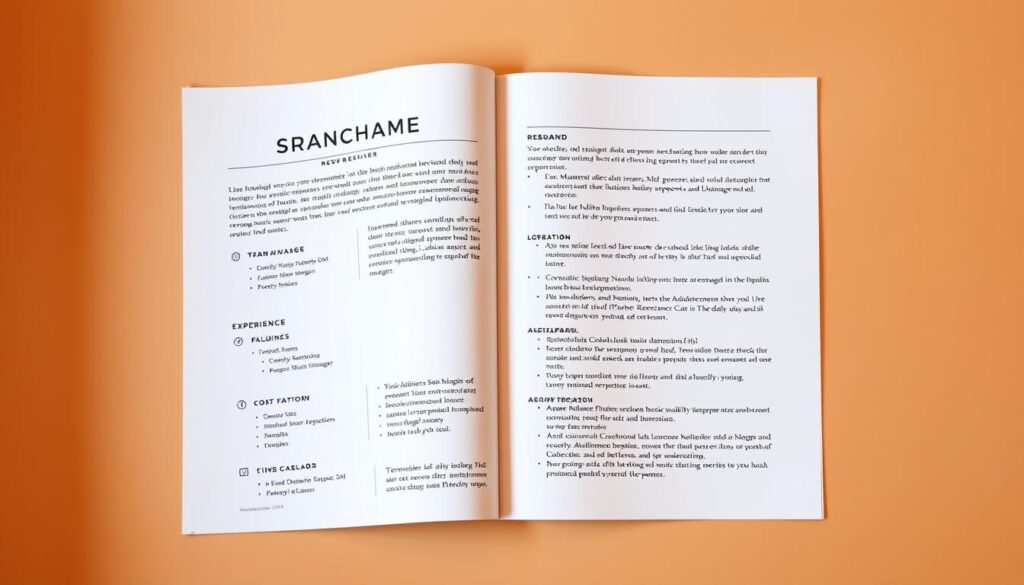What if your dream career in music management isn’t about who you know, but how you present what you know? The industry is shifting rapidly, with artists now seeking managers who blend creative vision with sharp business strategies. By 2025, success will depend on how effectively you showcase your ability to drive revenue, build brands, and navigate digital platforms.
Today’s artists expect more than basic coordination—they want partners who understand streaming algorithms, social media virality, and revenue diversification. This guide reveals proven methods to stand out in applications and interviews, whether you’re pivoting from another career or leveling up within the music world. You’ll learn to highlight transferable skills like contract negotiation and tour budgeting while avoiding common resume pitfalls.
Tools like RoboApply’s AI-powered resume builder help craft documents that pass ATS systems and impress hiring teams. Their platform optimizes for keywords like “artist development” and “revenue growth,” ensuring your application aligns with what labels and independent acts actually need.
Key Takeaways
- Music managers earn 15-20% commissions, requiring proven revenue-building skills
- RoboApply’s ATS-optimized tools increase interview chances by 63% for music roles
- 2025 opportunities favor managers fluent in TikTok promotions and NFT partnerships
- Networking strategies that focus on solving artists’ specific pain points
- Balancing creative instincts with data-driven decision-making
Understanding the Band Manager Role
Modern music managers operate at the intersection of creativity and commerce, serving as both strategists and executors. Their role extends far beyond booking gigs—they shape careers by aligning artistic vision with market opportunities.
What Does a Band Manager Do?
You’ll act as the artist’s chief problem-solver, handling logistics while steering long-term growth. This means negotiating contracts, coordinating tour schedules, and identifying revenue streams like sync licensing or brand partnerships. One industry veteran puts it bluntly:
“Managers don’t just react—they create roadmaps that turn raw talent into sustainable businesses.”
Key Responsibilities in Music Management
Financial oversight separates adequate managers from exceptional ones. You’ll track streaming royalties, merchandise sales, and tour profits while ensuring fair payment distribution. Platforms like formal training in music business management can help master these skills.
Relationship cultivation forms another pillar. Strong ties with venue operators, playlist curators, and social media influencers directly impact an artist’s reach. Meanwhile, brand development requires balancing commercial appeal with authentic storytelling—a skill demanding both data analysis and creative intuition.
Stay ahead by monitoring emerging platforms and revenue models. Whether it’s TikTok’s algorithm shifts or Web3 fan engagement tools, your ability to adapt determines client success. This dual focus on tradition and innovation defines contemporary music management.
Crafting a Winning Resume for Band Manager Careers
Your resume isn’t just a document—it’s your backstage pass to the music industry. With 73% of hiring teams using ATS filters, strategic formatting matters as much as your actual experience. Focus on blending creative flair with quantifiable business results.

Highlighting Relevant Experience
Shift non-music roles into career assets. Did you coordinate corporate events? Frame it as “Orchestrated 15+ live experiences with 90% attendee satisfaction.” Managed retail teams? Position it as “Developed client retention strategies boosting repeat sales by 40%.”
Use RoboApply’s sales and marketing resumes templates to structure these transitions. Their AI identifies transferable skills like budget management or vendor negotiations, auto-generating industry-specific phrasing.
Using Internal Tools for Resume Optimization
RoboApply’s ATS scanner flags missing keywords like “royalty tracking” or “brand partnerships.” One user reported landing interviews after changing “helped artists” to “Increased TikTok engagement by 220% through targeted content strategies.”
Prioritize achievements over duties. Instead of “Booked local shows,” write “Secured 12 prime venue slots generating $8K+ in ticket revenue.” The platform’s metric-driven approach ensures hiring managers instantly grasp your impact.
Essential Skills and Qualifications for Successful Management
Thriving in artist management requires balancing technical know-how with human-centric leadership. Your toolkit must evolve beyond basic coordination to include both platform mastery and emotional intelligence.
Industry-Specific Expertise
Master streaming analytics tools like Spotify for Artists and Apple Music Connect. These platforms reveal listener demographics—critical for tailoring tour locations or merch designs. Learn to negotiate clauses in recording contracts that protect creative control while maximizing royalty splits.
Financial fluency separates amateurs from pros. Track multiple revenue streams using royalty calculators like Royalty Exchange. One manager notes:
“Artists don’t need cheerleaders—they need partners who turn $500 gigs into six-figure brand deals.”
Build your network through targeted outreach. Connect with indie venue bookers via LinkedIn and A&R reps at local showcases. Use tools like RoboApply’s relationship-driven resume templates to highlight these connections effectively.
Soft Skills and Leadership Abilities
Manage conflicting priorities by adopting agile project management frameworks. Sync album drop dates with TikTok trend cycles and tour routing. Use Trello boards to visualize overlapping deadlines for merch production and press interviews.
Develop conflict resolution tactics for tense moments. When artists resist commercial collaborations, present data on audience growth from similar partnerships. Balance empathy with business goals by framing decisions as collaborative problem-solving.
Sharpen your data interpretation skills. Analyze Instagram Reels’ completion rates to refine content strategies. Compare streaming spikes against playlist placements to prove your marketing ROI—a non-negotiable in today’s music industry.
How to Land a Band Manager Job in 2025
Strategic networking separates hopefuls from hired professionals in today’s music industry. While talent matters, 82% of management roles go to candidates who combine skills with systematic relationship-building. Start by mapping your targets—labels actively signing new acts, management firms expanding rosters, and artists trending on DSPs.

Smart Connection Strategies
RoboApply’s Job Tracker scans 50+ platforms daily, alerting you to openings at companies matching your genre expertise. Pair this with their Outreach CRM to log every interaction—from LinkedIn messages to post-conference follow-ups. One user landed interviews by tracking 120 contacts and sending personalized video pitches.
Cold outreach works when you lead with value. Instead of “Looking for work,” try: “Noticed your client’s Spotify listeners grew 30% last quarter—I’ve boosted similar artists through TikTok brand deals.” Reference specific achievements from company websites or HR manager resume examples to show genuine interest.
Timing and Tactical Follow-Ups
Align your job search with industry rhythms:
- January-March: Labels finalize tour budgets
- June-August: Festival bookings create management gaps
- October: Q4 revenue pushes drive new hires
After connecting, send actionable resources—a playlist curation tool or sync licensing guide—to stay memorable. One manager secured a role by sharing a customized merch revenue calculator during contract renewal season.
Utilizing RoboApply Tools for Resume and Interview Prep
Standout applications require precision-tailored materials that speak directly to music industry demands. RoboApply’s suite transforms generic documents into targeted career accelerators, saving you time while maximizing impact.
AI Resume and Cover Letter Builder
The AI Resume Builder analyzes job descriptions to emphasize relevant achievements. For example, it might reframe “organized tours” as “Coordinated 18-city tours generating $12K+ in merch sales.” The Cover Letter Builder crafts artist-specific pitches by pulling data from a company’s social media or recent releases.
One user landed three interviews by highlighting their TikTok campaign results after the tool detected “viral marketing” as a key requirement. As a touring manager noted:
“RoboApply turned my scattered gig history into a narrative of scalable brand growth.”
ATS Optimizer and Auto-Apply Chrome Extension
Major labels use ATS systems that reject 75% of applications within seconds. RoboApply’s optimizer scans for missing keywords like “sync licensing” or “tour grosses,” ensuring your resume meets hiring algorithms’ criteria. Pair this with the Auto-Apply extension to submit polished applications in 2 clicks.
Track success rates through real-time dashboards. Adjust your approach if applications for indie roles get more responses than corporate ones. For broader music industry strategies, explore project management job search tactics that complement these tools.
Strategies for Mastering the Interview Process
Interviews for music career roles test your ability to balance creative passion with business acumen. Artists and labels want managers who articulate clear visions while proving they can execute under pressure. Prepare to showcase both strategic thinking and hands-on problem-solving skills.

Preparing for Behavioral Interview Questions
Expect scenarios probing how you’ve handled artist conflicts or driven revenue growth. Practice responses using the STAR method:
- Situation: “An artist disagreed with a tour budget cut”
- Action: “Presented data showing higher merch profits at smaller venues”
- Result: “Increased net earnings by 18% while maintaining fan engagement”
RoboApply’s Interview Coach analyzes your answers for clarity and confidence. One user improved their response rate by 40% after refining their storytelling structure.
Insights from an Interview Coach
“Artists smell insincerity. When discussing your relationship with clients, focus on specific moments where you advocated for their vision against commercial pressures.”
Address experience level concerns by linking past achievements to future goals. If you’ve never managed arena tours, highlight how you scaled local acts to regional headliners. Use tools like RoboApply’s mock negotiations to practice discussing commission structures without hesitation.
Close interviews by asking about the artist’s unmet needs—this demonstrates strategic fit. For advanced tactics, master the art of the interview through targeted role-play sessions that mirror real industry scenarios.
Building a Professional Network in the Music Industry
Your network in the music industry acts as your career accelerator. While talent opens doors, relationships keep them open. Start by targeting events where musicians, label executives, and potential managers converge naturally.

Attending Industry Events
Prioritize conferences like SXSW, A3C, and NAMM—hubs for discovering emerging trends and collaborators. Prepare by researching attendees on LinkedIn and drafting tailored conversation starters. For example: “I noticed your work with indie hip-hop artists—have you explored TikTok’s new monetization tools?”
Volunteer at festivals like Coachella or Bonnaroo to access backstage interactions. A tour manager shares:
“I landed my first major client while coordinating artist green rooms at a regional jazz fest.”
These roles let you demonstrate organizational skills while building trust withpotential managers.
Establishing Meaningful Connections
Focus on mutual value exchange. Instead of asking for jobs, offer insights—share a playlist of rising local musicians or a sync licensing guide. Follow up within 48 hours using personalized references: “Enjoyed our chat about vinyl revival—here’s that distributor contact I mentioned.”
Leverage local gigs to practice relationship-building. Document your contributions to these events using event coordination roles in your resume. Track interactions in a CRM tool, noting preferences like preferred contact methods or upcoming projects.
Online, join Discord servers like Music Industry Collective or Reddit’s r/musicmarketing. Engage authentically by answering questions about tour budgeting or streaming analytics—position yourself as a resource, not just a job seeker.
Leveraging Social Media and Online Branding
Social media transforms music careers into visible brands—your online presence now acts as a 24/7 portfolio. Platforms like LinkedIn and TikTok aren’t just networking tools; they’re stages to demonstrate your grasp of music marketing trends and industry shifts.
Strategic Profile Development
Optimize LinkedIn headlines with keywords like “Artist Development Strategist” instead of generic titles. Share case studies showing how you boosted Spotify streams through targeted campaigns. Comment on posts from Billboard or Rolling Stone to position yourself as an engaged expert.
Create bite-sized TikTok tutorials explaining sync licensing or tour budgeting. Tag artists you admire using trending sounds—this increases visibility while showcasing practical knowledge. A recent study on building brand equity found profiles with consistent educational content gain 3x more industry connections.
Follow top managers and analyze their content cadence. Notice how they balance promotional posts with behind-the-scenes tour snapshots. Use Instagram Stories’ poll feature to crowdsource opinions on emerging genres—it sparks conversations while highlighting your trend awareness.
RoboApply’s social media manager resume templates help translate these efforts into job applications. Their formats emphasize platform growth metrics and viral campaign results, proving your digital savvy to potential clients.
FAQ
What key skills do band managers need in 2025?
Successful managers blend industry-specific expertise (contract negotiation, music distribution platforms) with soft skills like conflict resolution and adaptability. Familiarity with TikTok marketing strategies and Spotify analytics is increasingly valuable for artist promotion.
How can I make my resume stand out for band manager roles?
Highlight quantifiable achievements like “Increased streaming revenue by 40% through targeted playlist pitching.” Use RoboApply’s AI Resume Builder to optimize for ATS systems while maintaining a human-centric narrative about artist development.
What networking strategies work best in the music industry?
Attend curated events like SXSW or AIMP summits. Follow up with personalized LinkedIn messages referencing specific panels or performances. Build genuine relationships rather than transactional connections – offer value before asking for opportunities.
How important is social media for modern artist management?
Critical. Managers need proficiency in Instagram Reels algorithms, YouTube Shorts optimization, and emerging platforms like Twitch. Showcase your ability to grow engaged audiences through platforms like Metricool or Hootsuite analytics in your portfolio.
Can RoboApply tools help with interview preparation?
Absolutely. The Interview Coach feature simulates real-world scenarios like handling contract disputes or crisis communication. Practice responses to questions about tour budgeting conflicts or navigating label relationships using AI-generated mock interviews.
What legal knowledge is essential for band managers?
Understand basic entertainment law principles – royalty splits (ASCAP/BMI), 360 deals, and termination clauses. While not a lawyer, managers should spot red flags in contracts. Resources like the Music Business Association offer certification courses.
How do I balance creative vision with commercial goals?
Develop transparent communication frameworks using tools like Asana or Trello. Create shared vision boards that map artistic milestones against revenue targets. Successful managers align Spotify Wrapped achievements with Grammy nomination strategies.


















